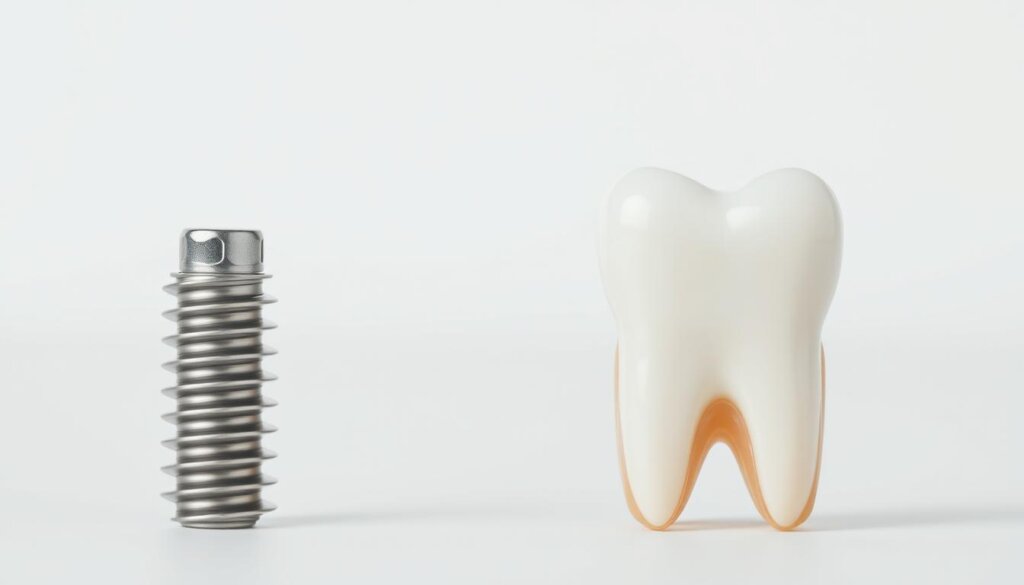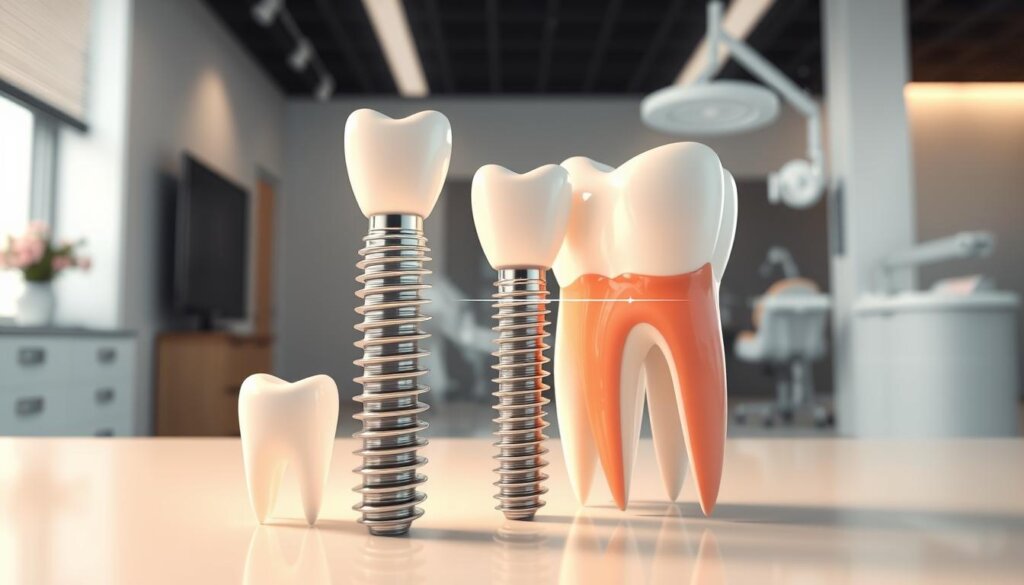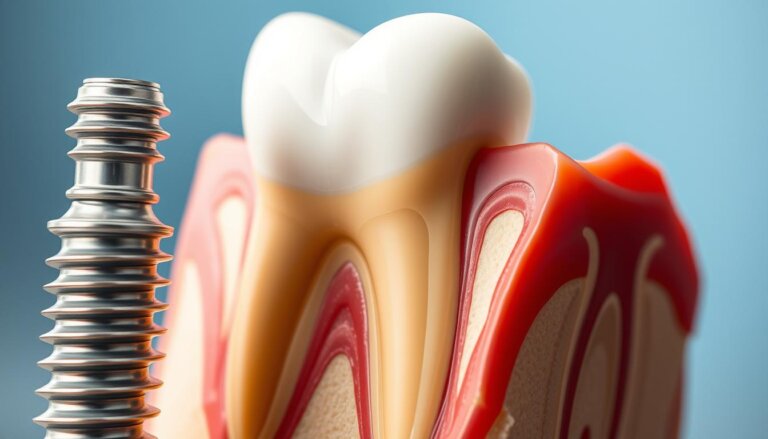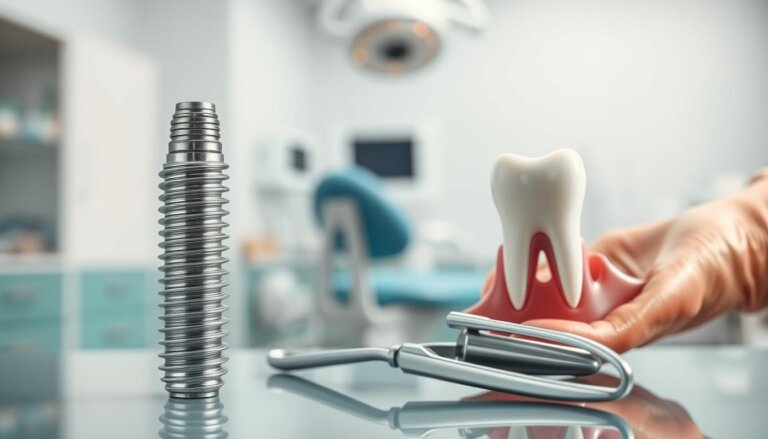Dental Implant vs. Artificial Tooth: The Truth
About 120 million Americans are missing at least one tooth. This significant number puts many people at a decision point. They wonder—is a dental implant the same as an artificial tooth? Knowing the differences between dental implant vs artificial tooth helps make good healthcare choices.
Dental implants are a big step forward from traditional artificial teeth. They are made to act like a real tooth, with a custom crown and a titanium post that fixes into the jawbone. This setup imitates a tooth’s root, offering strong support. This solution even delivers a bite strength that might beat a natural tooth’s. Our teeth play a huge part in eating and talking every day.
When comparing dental implant or artificial tooth, there are clear differences, especially in how long they last and their overall benefits. Artificial teeth, such as bridges or dentures, do their job but can’t match all the advantages of dental implants. Artificial options might need tweaks or replacements, but implants offer a lasting solution and keep your face looking natural. Camelot Dental Group and many dental pros suggest dental implants for anyone looking to fill gaps in their smile.
Key Takeaways
- Dental implants provide better bite strength and last longer than traditional artificial teeth.
- Their unique structure with a titanium post allows implants to integrate with jawbones, unlike artificial teeth.
- Camelot Dental Group recommends dental implants for their look and function.
- Though they cost more upfront, dental implants are more durable and offer greater value over time.
- Choosing between dental implants and artificial teeth depends on oral health, lifestyle, and personal preferences.
Understanding Dental Implants
Looking into tooth replacement options? Know that dental implants are a top choice. They’re different because they connect directly to the jawbone. This makes them durable and long-lasting. Let’s dive deeper into what dental implants are, their parts, and how they work. We’ll also see how they differ from dentures.
Definition of a Dental Implant
A dental implant acts just like a real tooth. It has a titanium post that goes into the jawbone, acting as a tooth root. Then, there’s a crown that everyone can see above the gum. Dental implants can join with the bone, a process called osseointegration. This keeps the jawbone healthy and the implant sturdy.
Components of a Dental Implant
The dental implant consists of three main components:
- Implant Post: This titanium piece is put into the jawbone. It acts as the tooth’s root.
- Abutment: It joins the implant post with the dental crown. It’s like a bridge connecting them.
- Crown: This part is designed to look like your real teeth. It’s made from materials like ceramic or porcelain.
How Dental Implants Work
Dental implants bond with the jawbone through osseointegration. This process is key to their success. It stops bone loss and keeps your face’s shape. Over time, the implant and bone fuse to form a firm base. This lets the crown work like a real tooth when eating.
To compare dental implants and artificial teeth, remember this. Dentures and bridges only replace the tooth you see. But, dental implants replace the root and the part you see. This does more than just make them work better. It helps your oral health by protecting the bone and teeth around the implant.
What is an Artificial Tooth?
When looking into dental implant versus artificial tooth options, it’s key to know what an artificial tooth is. It’s made to work and look like a real tooth. But, it doesn’t have the natural tooth’s pulp or root. Instead, it uses materials to do the tooth’s main jobs.
Dentists try to keep natural teeth as much as they can because they can last a lifetime if taken care of. But when they can’t save the tooth, they go for artificial ones. These artificial tooth options can last from five to twenty-five years. This depends on how well they’re cared for and the health of the mouth.
Definition and Purpose of Artificial Teeth
An artificial tooth fills in for missing teeth. It keeps the mouth’s structure, stops other teeth from moving, and helps in important things like eating and talking. They look and work like real teeth. This is very important for dental health and how confident the person feels.
Types of Artificial Teeth
- Removable Dental Prosthetics: These are dentures that can replace a few or all missing teeth (partial or complete dentures).
- Fixed Dental Prosthetics: These are crowns and bridges glued onto teeth or implants for a more lasting fix.
Each type of artificial tooth has its own pros and things to think about. It’s important to talk with a dentist about the artificial tooth options out there.
Key Differences Between Dental Implants and Artificial Teeth
When you’re looking at choices for replacing missing teeth, knowing the key differences between dental implants and false teeth matters a lot. Each option has its own benefits and features that fit different needs. Your choice between a dental implant and a false tooth often depends on your bone health, how you live, and what you prefer.
Structural Differences
Natural teeth are made of enamel and have roots in the jawbone. Dental implants, on the other hand, are like titanium screws that act as roots for crowns or bridges. This lets them blend with the bone, giving the strength and stability of real teeth. False teeth, such as dentures or bridges, sit on the gums or hook onto nearby teeth.
Functionality and Usage
Dental implants work much like natural teeth, which is a big plus compared to false teeth. Since implants are fixed in the jawbone, they are more durable and handle biting and chewing better. Dentures might slip or need removal for cleaning, but implants stay put and need no extra care. Also, implants help keep your bone and face shape from changing, which can happen with tooth loss over time.
| Feature | Dental Implants | False Teeth |
|---|---|---|
| Material | Titanium and ceramic | Acrylic and other plastics |
| Attachment | Fused to jawbone | Sits on gums or hooks to adjacent teeth |
| Maintenance | Regular brushing, flossing | Needs to be removed and cleaned separately |
| Longevity | Designed to last a lifetime with proper care | May need replacement every 5 to 8 years |
| Functionality | Like natural teeth: allows for normal eating and speaking | Can slip when eating or speaking; may cause discomfort |
Choosing between a dental implant or false tooth means looking at these differences and thinking about what you need. Talking to a dentist and understanding these options can help you make a choice that’s good for your long-term oral health.
Installation Process of Dental Implants
Getting dental implants starts long before the surgery. It includes many steps to make sure the implant works well. Knowing the dental implant installation process makes patients feel more at ease and ready.
Initial Consultation
The first step is a detailed check-up during the consultation. Dentists look at overall mouth health, check jawbone strength, and learn about the patient’s health history. This part is key to making a plan that meets each patient’s needs and hopes.
Surgical Procedure
The main part of getting a dental implant is the surgery. It needs great skill and precision. A dentist or surgeon puts a titanium post into the jawbone. This post will hold the new tooth. If needed, this step might include bone grafting to ensure there is enough bone for the implant.
Recovery Period
After the surgery, taking care of the implant is very important for its success. The recovery time lets the implant bond with the jawbone. This can take some months. During this time, patients must keep their mouths clean and see their dentist regularly. This helps to make sure the implant bonds right and there are no problems.
Patients get a lot of help from their dental team during the dental implant installation process. Their team gives clear instructions and support from the first visit to the end of recovery. Each step is important to ensure dental implants are comfortable, work well, and last a long time.
Maintenance of Dental Implants
Taking good care of dental implants is crucial for their success and durability. These modern solutions feel almost like real teeth, but they need careful attention to stay in top shape. It’s key to know how to clean them daily and why seeing your dentist regularly is important.
Daily Care Requirements
Dental implants need cleaning just like your real teeth do. You should brush them twice a day, floss, and rinse with an antibacterial mouthwash to stop plaque and infections. Use soft toothbrushes and gentle toothpaste to keep them scratch-free. For those tight spots, special floss or brushes made for implants work best.
Regular Dental Check-ups
Seeing your dentist often is very important for implant care. These visits help check the implant and gums, making sure everything is working right. It’s usually best to go every six months. Your dentist can clean them professionally and catch any problems early.
Following these steps helps keep your implants and mouth healthy. Treat implants like your real teeth, and they will last for many years.
Longevity of Dental Implants vs. Artificial Teeth
Choosing between dental implants and artificial teeth is important for those looking at long-term dental choices. Studies show that dental implants often last longer than options like bridges and dentures. By knowing what makes dental implants so durable, their lifespan can be extended.
Dentists often suggest dental implants because they last a long time. They blend with bone, becoming a lasting fix with the right care and dental visits.
| Factor | Impact on Dental Implants | Impact on Artificial Teeth |
|---|---|---|
| Material Quality | High-quality titanium ensures durability and osseointegration | Materials may degrade over time, requiring replacements |
| Oral Hygiene | Essential for preventing peri-implant diseases that could reduce implant life | Important for preventing decay in remaining teeth and gum disease |
| Professional Care | Regular check-ups can extend lifespan significantly | Adjustments and fittings may be necessary periodically |
Dental implants can last for decades, which is much longer than bridges or dentures. These need replacing every 5 to 10 years. Yet, their longevity relies on several factors, including the surgery team’s skill, quality aftercare, and the patient’s oral hygiene commitment.
To ensure implants last a long time, a detailed evaluation and careful installation are crucial. Once in place, a thorough oral health plan, with at-home care and dentist visits, is essential. This approach extends their life, saves money, and improves oral health.
Benefits of Choosing Dental Implants
Choosing dental implants can greatly improve your life. We will look at the main benefits they offer for your dental health. These benefits touch on both how well you can use your teeth and how they look.
Enhanced Oral Functionality
Dental implants bring back your mouth’s ability to work well. They are put into the jawbone, acting like a tooth’s root. This makes them much more stable than dentures or bridges. Here’s how dental implants make your mouth work better:
- They let you bite stronger, so you can eat a wider variety of foods, even hard ones that people with dentures can’t.
- Dental implants keep your jawbone healthy. They give the bone the stimulation it needs, just like real tooth roots, stopping bone loss.
- They improve how clearly you can talk by stopping the moving that often happens with dentures.
Improved Aesthetic Appearance
Dental implants also make your smile look better. They fill in for missing teeth, keeping your face from looking sunken in. Because they fit so well in your mouth, they look real and attractive. Here are the key ways they make your smile prettier:
- They help keep the natural shape of your face and jaw, preventing the look of aging that missing teeth can cause.
- Implants can be made to match your teeth perfectly, so they blend in well.
- They don’t need the teeth next to them to be filed down, keeping your natural teeth intact.
The benefits of dental implants include more than just being able to chew better. They also make your smile brighter. That can give you more confidence and make your life better. Knowing these benefits can help people decide to choose implants over other ways to fix their teeth.
Risks and Considerations
Dental implants are a lasting and aesthetic choice for missing teeth, but it’s important to consider the risks of dental implants and considerations for implant surgery. These factors are key to the success of the surgery and the patient’s health later on.
Potential Complications from dental implant surgeries can range from small to big issues. Common problems include infection at the site, nerve damage causing pain or numbness, and sinus issues when implants in the upper jaw affect the sinuses. Also, if the implant doesn’t properly join with the jawbone, it might fail.
Candidacy for Dental Implants is crucial to think about. Not everyone is a good fit for dental implants. Important factors for eligibility include:
- Healthy oral tissues
- Enough bone density to hold the implant
- No conditions that might stop bone from healing
- Non-smokers, or those who can stop smoking during healing
People thinking about dental implant surgery should talk deeply with their dental specialists. These experts will look at their medical history and oral health to lower the risks of dental implants. It’s vital that the considerations for implant surgery match the personal needs of each patient. This helps achieve the best results and makes patients happy.
Cost Comparison: Dental Implants vs. Artificial Teeth
When thinking about fixing your teeth, it’s smart to look at all the costs. Not just what you pay at first, but how much money you’ll need in the long run for things like artificial teeth or implants. By understanding these costs, you can make a better choice based on your budget.
The first price tag for dental implants is often higher than for regular artificial teeth.
The total cost for dental work depends on several things. These are:
- The materials used for dental implants or artificial teeth
- How complex the installation is
- Whether you need extra treatments like bone grafting
Dental implants might hit your pocket harder at first, but they’re worth it down the line. They last longer and won’t need as many fixes. This means less time in the dentist’s chair and saving money on replacements. This really shows in the financial side of choosing artificial teeth.
| Cost Factor | Dental Implants | Artificial Teeth |
|---|---|---|
| Initial Installation | Higher | Lower |
| Maintenance | Lower | Higher |
| Longevity | Longer | Shorter |
This chart shows how paying more now could mean saving money later. It captures the money side of deciding between dental implants and other options for artificial teeth.
To wrap it up, dental implants do cost a lot upfront. But, their long life and fewer dentist visits can make them a smart financial choice. This gives you a complete look at the money part of this decision.
Choosing the Right Option: Personal Considerations
Choosing between dental implants or false teeth relies heavily on personal factors. Analyzing your lifestyle and oral health helps make a choice that benefits you long-term.
Your daily life and habits are key in deciding on dental work. It’s crucial to see how either option fits into your routine.
Lifestyle Factors
- Eating habits: Implants or false teeth influence what you can eat, with implants often allowing a wider food selection.
- Social interactions: The dental solution you choose can affect your confidence, especially if looks and function matter to you.
- Physical activities: Dental implants tend to offer better support and comfort for those who are very active.
Oral Health Status
Knowing your oral health status is crucial when choosing implants or false teeth. Implants need good bone density and dental health. Here’s what to consider:
- Talk to a dentist about your bone density and gum health.
- Look at how past dental work has impacted your oral health.
- Think about if you’re prone to diseases like periodontitis, as it might affect implant success.
Overall, getting the full picture of your lifestyle and oral health matters in deciding on dental work. It’s important to use this info, along with a dentist’s advice, to choose the best option for your health and happiness.
Conclusion: Making an Informed Decision
Choosing between dental implants and false teeth is a big step towards good oral health and looks. Dental implants offer great benefits like lasting a long time, looking like real teeth, and helping keep the jawbone healthy. They also work well with the body, giving a strong base for new teeth.
Thinking over everything we’ve talked about, remember, there’s no one-size-fits-all answer. It’s important to think about your own dental needs, current oral health, and what you want for the future. Always talk to a dentist. They have the know-how and experience to suggest the best option for you.
Choosing the best dental treatment can really improve your life. Whether you go for implants or other fake teeth, the aim is to fix function, keep you healthy, and make sure you’re happy with the result. It’s crucial to get advice from a dentist you trust. They’ll help you navigate through your choices, making sure you keep smiling brightly for years to come.





